
 |
||||
|---|---|---|---|---|
| Volume 53 Number 10, April 22, 2023 | ARCHIVE | HOME | JBCENTRE | SUBSCRIBE |
Earth Day 2023
Workers' Weekly Internet Edition: Article Index : ShareThis
Earth Day 2023:
The Necessity to Humanise the Natural and Social EnvironmentNATO proxy war against Russia in Ukraine:
No British Depleted Uranium Shells to Ukraine!25th Anniversary of the Good Friday Agreement:
Oppose British Government's Attempts to Block the Irish People from Exercising their Sovereignty
Sinn Féin President on the Political Leaders of Today
From the Party Press:
Northern Ireland: Whose Agenda?For Your Information:
The Belfast/Good Friday Agreement - 25 years onWorkers' Forum:
Junior Doctors Persist in their Just Struggle70 years of US interference and provocations on the Korean Peninsula:
Condemn the Never-Ending US Military Exercises on the Korean Peninsula Rehearsing Invasion of the DPRK
DPRK Counters War Exercises that Threaten its Right to Be
Support the Korea Peace Appeal

On Earth Day 2023, broad sections of the people, including the youth and working people from many walks of life, are demonstrating their determination to restrict and deprive the monopolies and oligopolies and governments in their service of their ability to pollute, destroy, wage wars, exploit, criminalise and deprive the people of their right to a say over all matters which affect their lives.
As a result of the crisis of climate change and global warming, humanity faces a truly grave situation. In this context, the working class and people face the absence of decision-making power as the cartel party system brings governments to power which serve narrow private interests and cause serious harm to the natural and social environment. Governments continue their relentless promotion and defence of companies whose pursuit of private profit endangers working people and the environment. How new technology is used and for what purpose is a matter which must be brought under the control of the people, not to benefit narrow private interests which have taken over government decision-making. The passion of ordinary people, especially the youth, is to make a priority of taking care of Mother Earth; there is a striving for empowerment of working people from all walks of life. To humanise the natural and social environment, the stranglehold of the oligopolies over government decision -making and their rule must be broken.
On Earth Day April 22, the peoples of the world are coming together to demand proper attention be paid to Mother Earth and to denounce the fact that their concerns are not being met. The more environmental disasters occur, the more disinformation pours from the official circles in the United States, Britain, the countries of Europe and others which represent the global elite. They attempt to give the impression they are taking measures to bring the climate crisis under control while in fact increasing the number of damaging pay-the-rich schemes and other self-serving practices, all the while spouting the high ideal of "greening the economy". But according to the climate plans submitted to the UN by 50 countries, 12 gigatons of CO2 per year will continue to be emitted by 2050 and will need to be removed from the atmosphere.
People are striving to stay the hand of the elites in the here and now and hold them to account to overcome the disasters taking place as a result of the climate crisis and related problems. The pollution of the rivers and coastal waters through the unchecked discharge of sewage is one clear example. In this regard, the privatisation of water must be brought to an end. The creation of alternative forms of energy which do not involve fossil fuels are necessary but themselves do not resolve the problem of global warming and despoliation of the environment if under the control of those whose interest is maximum profit and not humanity's well-being. Fracking is another example of a pernicious practice. What is crucial is that energy and the direction of the economy as a whole must be under the control of the people themselves.
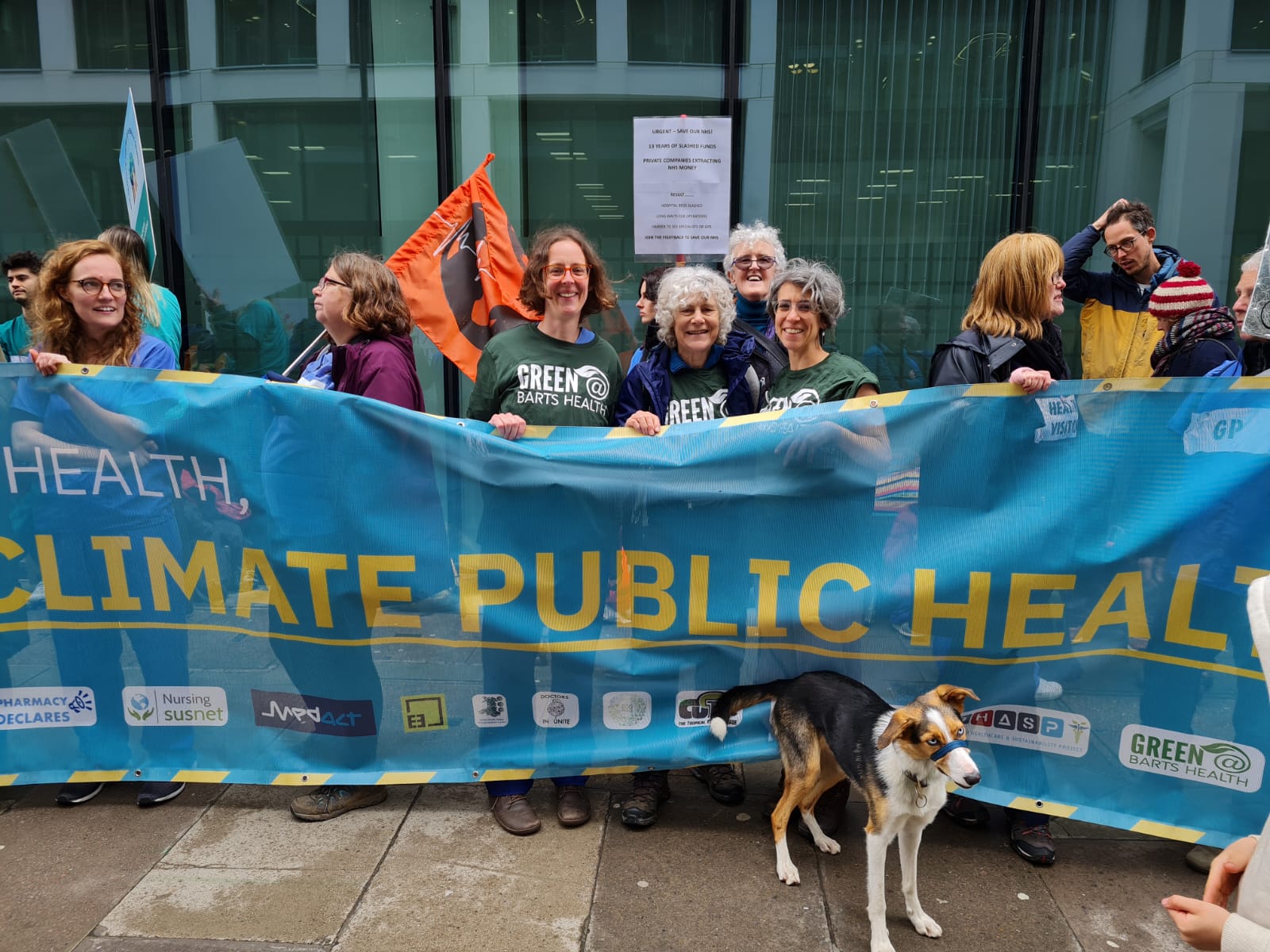
On Earth Day it is also important to uphold the dignity of labour. To uphold the dignity of labour and Mother Earth means to bring social consciousness to the fore within the socialised economy and in political affairs. Only if working people themselves have a say and control over the production and distribution of the social product they create through their work can the serious problems facing Mother Earth and our societies be provided with solutions.
Furthermore, opposition to US/NATO-led wars of aggression and occupation must be high on the agenda. The war industry, of which Britain is a major and central player, causes massive destruction and pollution. Governments serving the elites, as is happening at present in Britain, are refusing to acknowledge the worth of working people as "unaffordable" and the like, while always finding funds on the magic money-tree for war and military aggression. In this respect, privatisation of public services is going hand-in-hand with imperialist war and destruction of the environment. Dismantling the aggressive NATO military alliance is thus required as an essential component for the flourishing of humanity's control over natural resources and building a human-centred society.
All governments of the ruling elite, regardless of party affiliation, have shown in practice that they fully identify with the narrow stance of private interests of the rich and the demands of the pro-war government in the United States. The Westminster consensus of the cartel-parties does everything possible to stamp out the anti-war concerns of the people and marginalise those that raise these concerns. This situation underlines the necessity for the demand to renew the political process, leading to a modern form of government which is anti-war as an essential part of fighting for peace and the respect for Mother Earth and the interests of humanity.
The warranted conclusion is that to further strengthen the movement of the people this Earth Day, the perspective of empowering working people must be espoused, so that the people can be at the forefront of all economic, political and social decision-making. The people must put themselves in the position of decision-makers and take control of the direction of the economy so that it can be organised in a manner that protects the environment and affirms the right to be of the peoples of the entire world. This is the way forward to humanise the natural and social environment!
***
Earth Day Action

Parliament Square 10am 21-24 April
People's Pickets 7am 21 & 24 April
The invitation is for everybody to Unite to Survive at 'The Big One' - a four day action from the 21st to the 24th April 2023, where people from all groups and movements, not just XR, will gather throughout Westminster and at the Houses of Parliament.
More than 200 organisations are supporting - including Greenpeace, Friends of the Earth and PCS Union to name but a few.
The streets will be transformed with People's Pickets outside government departments and a diverse programme of speakers, performers and workshops, awash with colour and culture. There will be art and music, talks from experts, places to listen and engage, and activities for the kids.
Friday 21st - Unite to Survive. Westminster is filled with flags, banners
and people.
Saturday 22nd - Earth Day. An enormous, celebration & family-friendly march
for biodiversity!
Sunday 23rd - Running Out of Time! The Big One coexists with the London
Marathon.
Monday 24th - Choose Your Future. Parliament returns, the demand is delivered.
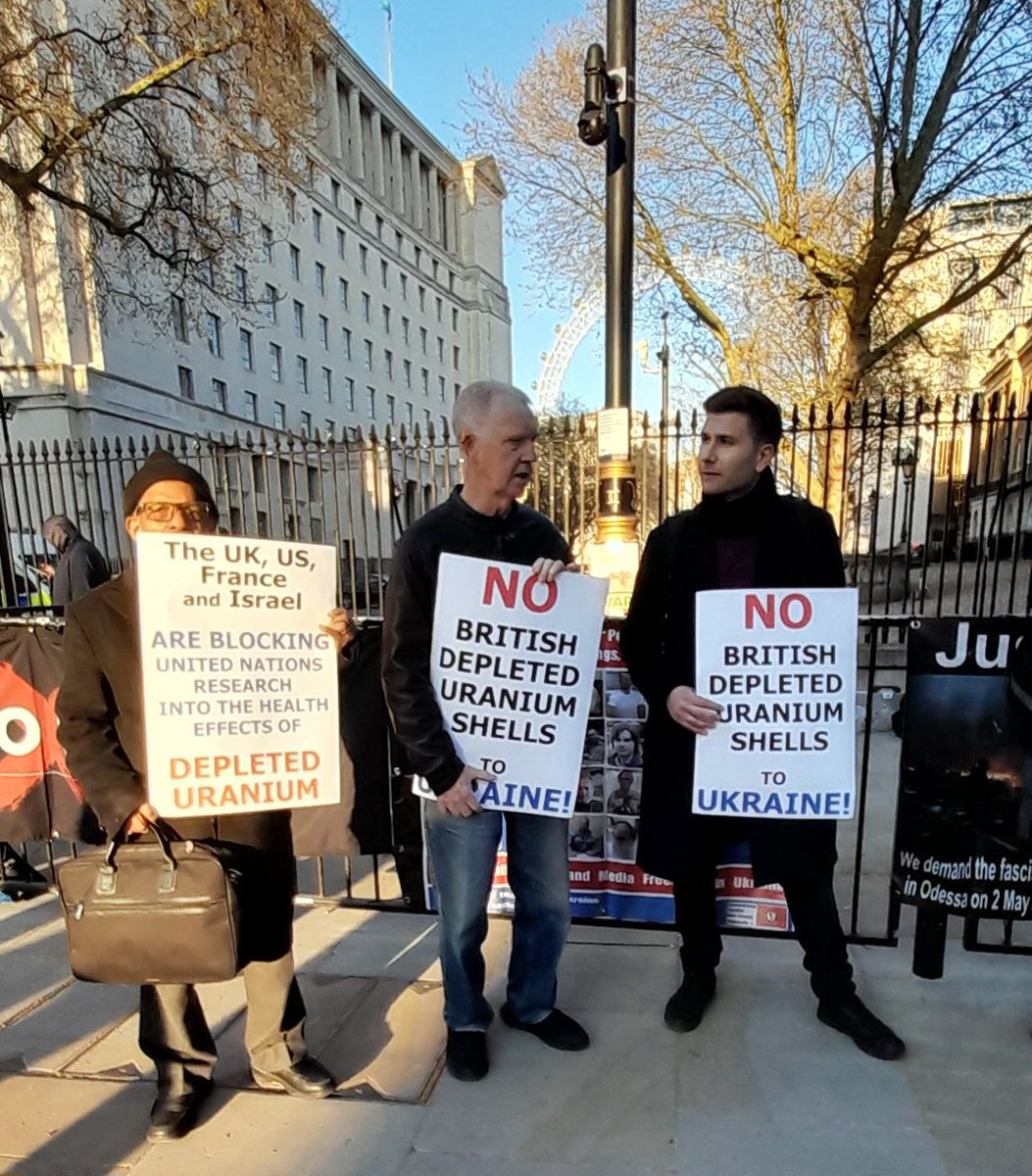
An emergency protest was held on Wednesday, April 19, in Whitehall, opposite Downing Street, organised by members of International Ukraine Anti Fascist Solidarity and NO2NATO - NO2WAR.
On March 21, the website Declassified UK revealed that the Britain will be sending depleted uranium (DU) shells to Ukraine to be used by the Challenger tanks Britain is sending.
DU ammunition was heavily used in the NATO bombing of Yugoslavia (10 metric tons) in 1999 and in the Iraq wars in 1990 and 2003 (300 metric tons). Large increases in horrific birth defects, leukaemia and other cancers, kidney damage, and mental illness in children have been recorded in areas where the munitions were used. DU weapons were also used by the US military in Syria in 2015.
In 2001, the World Health Organisation (WHO) completed a scientific review that concluded that depleted uranium is both chemically and radiologically toxic. To quote CND Chair Kate Hudson writing for the Stop the War Coalition on March 27, "The severe health consequences have led to the terms 'Gulf War syndrome' and 'Balkan syndrome' entering our vocabulary."
The DU used in battle is spread throughout the environment including the soil and water tables, and remains radioactive for more than 4.5 billion years.
The rich Western countries which dominate and control the UN and its bodies have promised to clean up the DU in Iraq, but have failed to deliver. And while respectable international scientific bodies claim there is insufficient evidence of the human health dangers, the US, Britain, France and Israel have repeatedly blocked funding for research requested by Iraq and the Non Aligned Movement, which represents a majority of the UN General Assembly.
According to the Bulletin of the Atomic Scientists, "DNA mutations caused by DU can, of course, be passed from parent to child. Hence, DU contamination from the US-led wars against Iraq in 1990 and 2003 appear to likely continue to cause a persistent national health crisis for future generations of Iraqis."
A 1977 amendment of Article 35 of the Geneva Conventions, prohibits any means or methods of warfare that cause superfluous injuries or unnecessary suffering, and prohibits those nations from resorting to means of war that could inflict extensive and long-term damage on human health and the environment.
The observed impacts of DU in Iraq suggest that these weapons do indeed fall under Article 35, due to their suspected long-lasting effects on human health and the environment.
Article 36 of the Geneva Conventions also obliges any state studying, developing, or acquiring a new weapon to hold a legal review of that weapon.
Thus far, Belgium (2007) and Costa Rica (2011) have passed domestic laws prohibiting uranium weapons within their territories. In 2008, the European Parliament adopted a resolution that stated that "the use of DU in warfare runs counter to the basic rules and principles enshrined in written and customary international, humanitarian and environmental law".
In 2006, the European Parliament strengthened its previous calls for a moratorium by calling for an introduction of a total ban, classifying the use of DU, along with white phosphorus, as inhumane.
It is likely that the people of the former Yugoslavia nations and Iraq will be living with the tragic consequences of the use of DU for generations to come, unless the rich nations come forward to finance environmental cleansing and monitoring on a massive scale.
The organisers of the emergency protest write that "we can try to stop DU weapons being used in yet another NATO-backed war, a war which the entire NATO alliance is prolonging with billions in arms deliveries and active support for the Kyiv government through intelligence and undercover forces operating in the country. We are calling on the British government to reverse its decision to send depleted uranium shells to Ukraine, and ensure that DU ammunition already sent to Ukraine is not used in battle."
(International Ukraine Anti Fascist Solidarity and NO2NATO - NO2WAR)

Belfast - Photo: Charles McQuillan Getty
Images
This year marks the 25th anniversary of the Good Friday Agreement concluded on April 10, 1998. The 25th anniversary of the signing is being widely hailed as a watershed in Irish politics. Sinn Féin and the patriotic Irish forces are determined that the current situation must develop into the exercise of sovereignty by the Irish people in a united Ireland while the British continue to treat the north of Ireland as their possession, interfere in Ireland's internal affairs and encourage everything that blocks the exercise of Irish sovereignty.

Sinn Féin protesters greet the Queen's visit to
northern Ireland in 1977
The Good Friday Agreement stipulated the creation of the Northern Ireland Assembly and its Executive. It further set up a north-south council for Ireland, a similar council for London-Dublin, a reduction of British military presence, and a disarmament of the IRA as well as the release of paramilitary prisoners. It became effective as of December 2, 1999.
It followed on from the historic Downing Street Declaration of 1993 at a time Britain was forced to change its policy on northern Ireland as a result of unfolding events both at home and abroad. The Downing Street Declaration reflected Britain's need to be seen as a force for peace in order to gain credibility as a peace-broker abroad, especially in the Middle East. The Declaration was signed by John Major on behalf of the British government and Albert Reynolds on behalf of the government of Ireland. It was the fruit of the struggle of the people to rid the north of the British army and ultimately to end the claim of Britain to possession of any part of the island of Ireland, and to end not only its apparatus of repression and decision-making but also its apparatus for violating the decision-making of the people of Ireland, whether in the north or the 26 countries which currently comprise the Republic of Ireland.
Today, the Irish people's history-making struggle has provided Sinn Féin with overwhelming support to form the government of the north of Ireland but Britain and the political forces at its disposal in the north will not lift their veto on the new arrangements. The crucial step, whether in the context of a united Ireland or the still-existing 26 and six countries, is that Britain end its alleged jurisdiction over any part of Ireland. The Irish people are striving to achieve this by continuing to develop political forms and processes which cement their unity in action and realise their right to self-determination without foreign interference in their internal affairs.
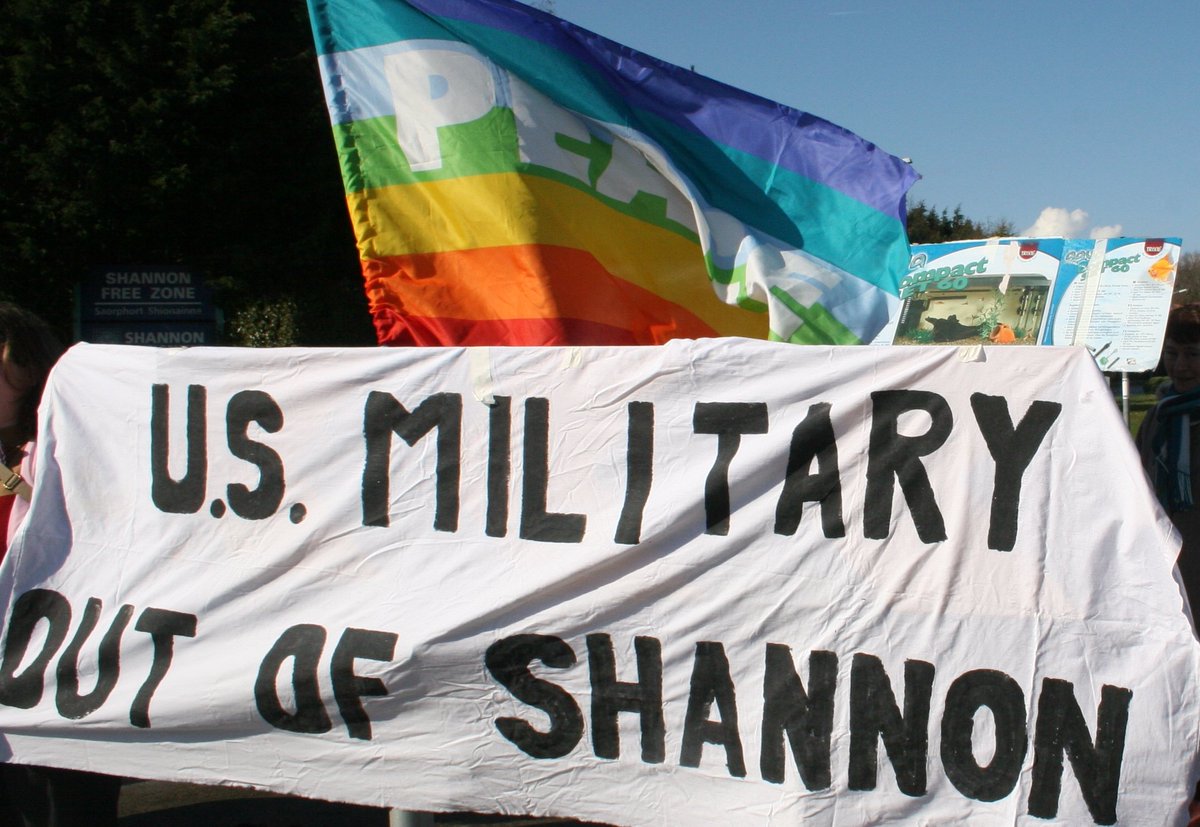
The peoples of Ireland, England, Scotland and Wales oppose the misuse of the "peace process" to exploit the Irish people through other means and embroil them in British and US imperialist striving for world hegemony, indicated by British Prime Minister Rishi Sunak's invitation to US President Joe Biden to celebrate the anniversary of the Good Friday Agreement in Belfast. Dismissing the fight of the Irish people for freedom, Biden credits the US for bringing peace to Ireland. For his part, Sunak is desperate to claim a win in the deal he has brokered with the European Union which, he claims, is a "decisive breakthrough" which ends the crisis caused by the dispute over the post-Brexit "Northern Ireland Protocol". He claimed that the changes would allow the UK to "take back control" by providing "stability in Northern Ireland". "It's about showing that our union that has lasted for centuries can and will endure," he said.
Britain should stop interfering in the affairs of the Irish people. How they want to proceed is up to them, nobody else. The progressive forces in Ireland demand as a principle that there must be no interference by the British government or the US administration in the internal affairs of Ireland.
This principle was enshrined in the Downing Street Declaration which guided the Good Friday Agreement. It said: "The British government agree that it is for the people of the Island of Ireland alone, by agreement between the two parts respectively, to exercise their right of self-determination on the basis of consent, freely and concurrently given, North and South, to bring about a united Ireland, if that is their wish." Despite this, Sunak is talking about "a union that has lasted for centuries and will endure," and the Northern Ireland Assembly, set up by the Good Friday Agreement, has been tainted since the beginning by British dictate, in particular the division into "two communities".
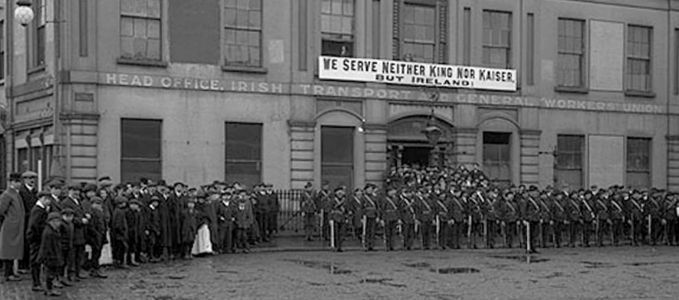
1914 photo of the Irish Citizen Army outside the Old
Liberty Hall, Dublin
It is the persistence of the British government that the six northern counties must remain part of the United Kingdom which is causing the Northern Ireland Assembly to be dysfunctional. The British government has no right to interference in the functioning of the Northern Ireland Assembly. This is a fundamental principle. The Irish people are striving to find a way forward both in the north and the south which favours the people. So too, the opinions of the entire Irish people who inhabit the island of Ireland are crucial for a permanent solution to the issue of Irish reunification.
The heroism of the Irish people in resisting the domination of their country
by the armed might of the British empire is legendary. Since the Downing Street
Declaration in 1993, and particularly since the voluntary conclusion of the
armed struggle in 1998, the people of Ireland themselves are involved in
sorting out their own decision-making and it is up to them to decide their own
future. The English working class is duty-bound to prevent the British
government from interfering in Ireland's
 internal affairs and oppose all its
attempts to set the agenda.
internal affairs and oppose all its
attempts to set the agenda.
As it did during the years of struggle in Ireland for Irish Freedom against British occupation, impunity and cruelty, so too today, the working class in England, Scotland and Wales stand as one with the Irish people as the makers of history. Theirs is a common cause to oppose and block the usurpation of their decision-making power by international finance capital and the narrow private interests which operate as cartels and coalitions of oligopolies, which includes the United States/NATO configuration.
To their credit, Sinn Féin's MPs elected to the Westminster Parliament have consistently refused to take their seats, because they refuse to pledge allegiance to the English monarch. This shows that the peaceful reunification of Ireland is on the agenda on the basis of building the Irish nation anew. The patriotism, internationalism, creativity, initiative and death-defying courage with which the Irish people have faced the cruelty of the British monarchy, which invaded and occupied Ireland in the past, and of British imperialism in the twentieth century, is indeed legendary. They are now proving themselves once again as they strive to engage all Irish people at home and abroad in a nation-building project which favours them and permits the emergence of a modern democratic personality in the form of a united Irish state which upholds the rights of all without exception.
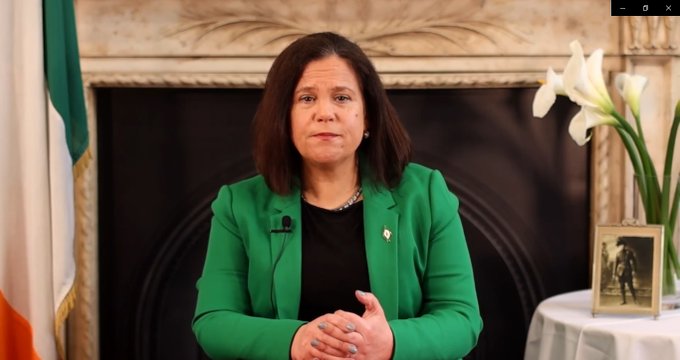
Sinn Féin Leader Mary Lou McDonald
Sinn Féin Leader Mary Lou McDonald on April 7 attended the event in Stormont organised by Northern Ireland Assembly Speaker Alex Maskey to mark the anniversary of the signing of the Good Friday Agreement. Speaking in advance, according to the Sinn Féin newsroom, Mary Lou McDonald, who is Teachta Dála [MP] for the Dublin Central constituency, said: "Today's political leaders need to recapture the spirit and determination that was seen on this weekend twenty five years ago."
The Sinn Féin President continued: "This weekend we mark the twenty-fifth anniversary of the Good Friday Agreement, an agreement that delivered peace and transformed Ireland. To this day, it stands as an historic, international success story in peace-making - a blueprint for the resolution of even the most intractable of conflicts. The agreement is a testament to what can be achieved when people come together in the spirit of hope. It made progress possible. It made change possible.
"Twenty five years ago political leaders showed huge courage not just in signing a peace accord but in establishing the power sharing political institutions. As a result of their work the Good Friday Agreement generation has grown up free of conflict, in a very different world full of hope and opportunity.
"We need to see that same courage and determination today. Today's political leaders need to recapture the spirit and determination that was seen on this weekend twenty five years ago. It is almost a year since the Assembly elections took place and this weekend the world is looking on in disbelief as power sharing institutions continue to be blocked.
"We need to restore the political institutions. We need progress. We need ambition.
"There is huge international goodwill towards Ireland, a huge appetite for progress, for investment but the economic opportunities that exist will not last forever and will only be properly realised with functioning institutions in place. So let's take this opportunity to work for all, to attract investment, to create jobs, to deliver change, to plan for the future.
"Twenty-five years ago, a generation wrote a ground-breaking chapter in Ireland's story. Now is the time to write the next chapter - the reunification of our country. Here in our time, we can build the nation home."
Workers' Weekly July 24, 1999
[...]
 The minimum
that could be pointed out is that the way that Westminster has fashioned the
Assembly is to attempt to institutionalise the division of the "two
communities". This very structure itself can be said to go against the
"Framework Document" of 1995 which specified that new political
institutions in Northern Ireland should "avoid any entrenchment of the
main community division". This, then, is supposed to give the Labour
government the right to declare the proceedings null and void when one party of
one of the "two communities" institutes a boycott. What should be
noted is the way Westminster passes Acts, tears them up, and passes more Acts
in the space of a few hours, just as it suits them. All this, of course, is
said by Tony Blair and the Labour Party to be done with the best of intentions.
It is all a matter of "devolution", doing what is best for the people
of Northern Ireland, working overtime with a "great sense of
responsibility" to sort things out. The working class cannot get diverted
by these manoeuvres, but must see them as further deepening the crisis of the
credibility of the parliamentary democracy they represent. In particular, it is
by virtue of the Royal Prerogative - that executive power in Northern Ireland
is vested in the Crown - that the government can give itself the justification
to act as it wishes with regard to the political process in the north of
Ireland. In other words, it once more underlines the profoundly absolutist
character of British parliamentary democracy.
The minimum
that could be pointed out is that the way that Westminster has fashioned the
Assembly is to attempt to institutionalise the division of the "two
communities". This very structure itself can be said to go against the
"Framework Document" of 1995 which specified that new political
institutions in Northern Ireland should "avoid any entrenchment of the
main community division". This, then, is supposed to give the Labour
government the right to declare the proceedings null and void when one party of
one of the "two communities" institutes a boycott. What should be
noted is the way Westminster passes Acts, tears them up, and passes more Acts
in the space of a few hours, just as it suits them. All this, of course, is
said by Tony Blair and the Labour Party to be done with the best of intentions.
It is all a matter of "devolution", doing what is best for the people
of Northern Ireland, working overtime with a "great sense of
responsibility" to sort things out. The working class cannot get diverted
by these manoeuvres, but must see them as further deepening the crisis of the
credibility of the parliamentary democracy they represent. In particular, it is
by virtue of the Royal Prerogative - that executive power in Northern Ireland
is vested in the Crown - that the government can give itself the justification
to act as it wishes with regard to the political process in the north of
Ireland. In other words, it once more underlines the profoundly absolutist
character of British parliamentary democracy.
The British government neither wants a state of open bloodshed in what it unjustly regards as the "province" of Northern Ireland, not does it wish to resolve the situation in the context of the sovereignty of the Irish people as a whole. The English working class, as well as all progressive people in Britain, must condemn Tony Blair for this state of affairs, carried out in defence of the status quo. They must also condemn him for using the Good Friday Agreement as a cynical manoeuvre which would be honoured only if events took the course he would wish, rather than as an agreement entered into in good faith as a step towards reuniting Ireland on terms in which the people are the decision-making power. This is no less than the Downing Street Declaration of 1993 itself recognised as the framework for progress in the north of Ireland, with the provision that it is achieved by consent. But since all parties agree not to impose their will by force, this is the recognition that this declaration contains of the right of the Irish people as a whole to self-determination. In particular, the British government affirmed in the Framework Document that it will not impede the option of a united Ireland.

The Belfast/Good Friday Agreement
A House of Commons briefing paper on the 25th anniversary of the Belfast/Good Friday Agreement
The Belfast Agreement - widely known as the Good Friday Agreement - was signed 25 years ago on 10 April 1998 following three decades of conflict known as "The Troubles". The Agreement created a new power-sharing arrangement, which included a Northern Ireland Assembly and Executive. It was based on a series of fundamental principles, including:
What is in the Agreement?
The Agreement comprises a Multi-Party Agreement between the UK and Irish governments and political parties in Northern Ireland, and the British-Irish Agreement between the UK and Irish governments, an international treaty. Both were approved by voters in concurrent referendums held in Northern Ireland and Ireland on 22 May 1998 and came into force on 2 December 1999.
The Agreement resulted in the creation of the three strands of political structures, respectively covering Northern Ireland's governance, North-South relations and East-West relations. The UK government is committed to upholding each of these strands, which all carry equal importance:
The Agreement also set out a series of important rights for the people of Northern Ireland, including on identity and citizenship, and made commitments on decommissioning, security, policing and prisoners.
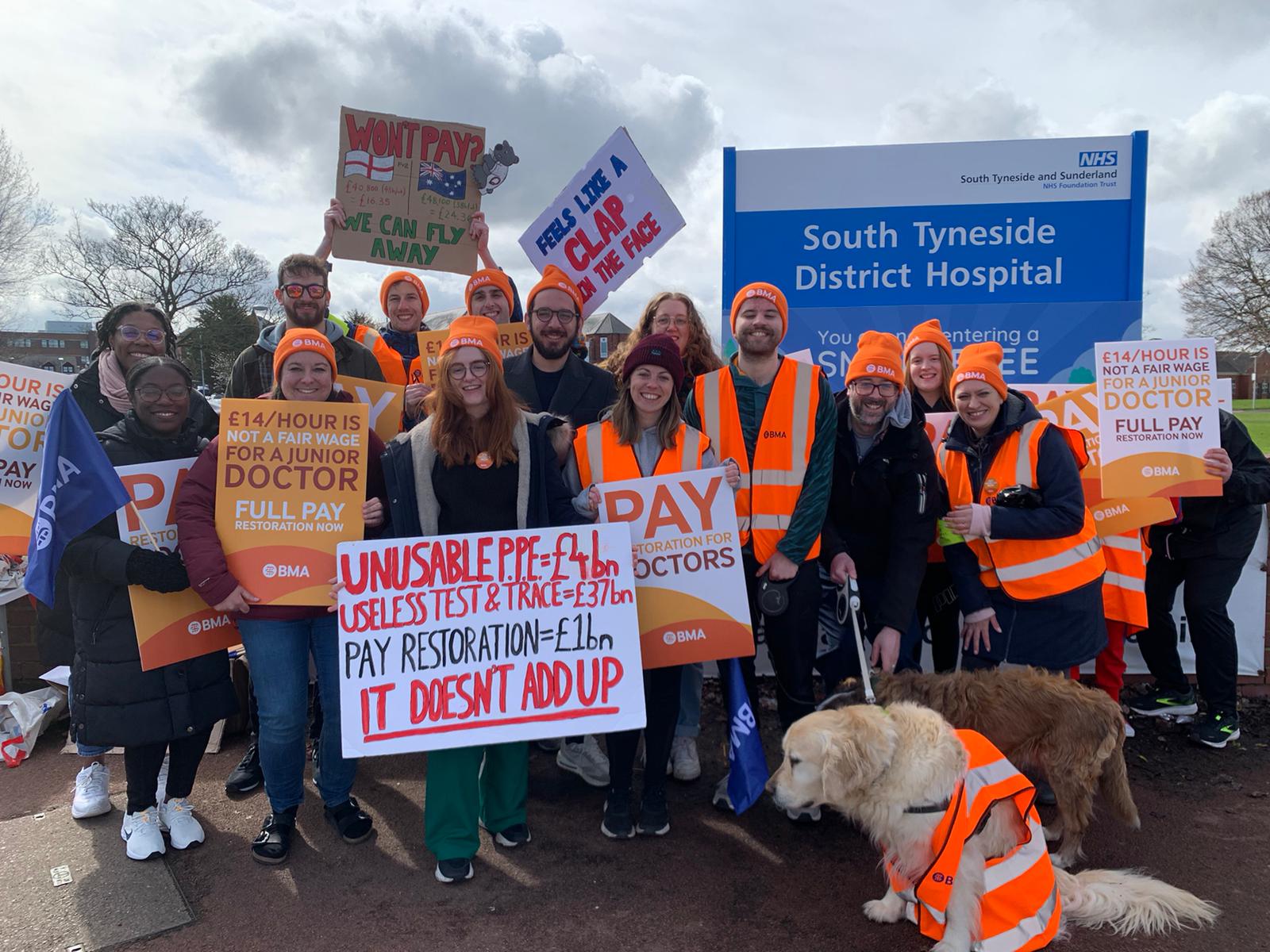
Junior doctors in England held a four-day strike from April 11-14. These doctors represent over 40% of medical professionals, including the newly qualified through to those with more than 10 years' experience.
An overwhelming 98% of British Medical Association (BMA) members backed strike action, on a turnout of 77%. The doctors are demanding a 35% pay rise due to 15 years of real-terms pay cuts. Junior doctors' inflation-adjusted pay has fallen by 26% since 2008, leading to a crisis in recruitment and retention, according to the BMA. Though the action covered all services, the BMA took action to protect patients, such as bringing junior doctors off picket lines where hospitals reported lives were in immediate danger.

Leading up to the strike, the NHS Confederation, which represents health service trusts, estimated that the strike could affect the timing of up to a quarter of a million operations and appointments. The NHS stated its intent to prioritise resources to protect emergency treatment, critical care, maternity and neonatal care, and trauma.
The BMA is asking for a credible offer from Health Secretary Steve Barclay to start negotiations to address the real terms pay cut.
"All we're asking for is a credible offer that shows us he's serious," said Vivek Trivedi, co-director of the BMA Junior Doctors' Committee. Likewise, Deputy Chair of the Committee Dr Mike Greenhalgh said that "it's hard to negotiate when only one side is doing it."
Treating the junior doctors' just demands with contempt, Barclay branded them "unrealistic". But he is the one who needs a dose of reality. The cuts will not solve the problems of a health service that cannot recruit. The demands are as realistic as much as they are essential. Barclay's huckstering flies in the face of what is necessary to uphold the future of the NHS and the fact that the society demands that doctors and health professionals are in place and working. Without recruitment of doctors, there is no credible health service, society cannot function, and society would face an existential crisis. Without a health service, no modern political or social system can function properly. The demand will come back time and time again if such issues of human and social relations are not resolved.
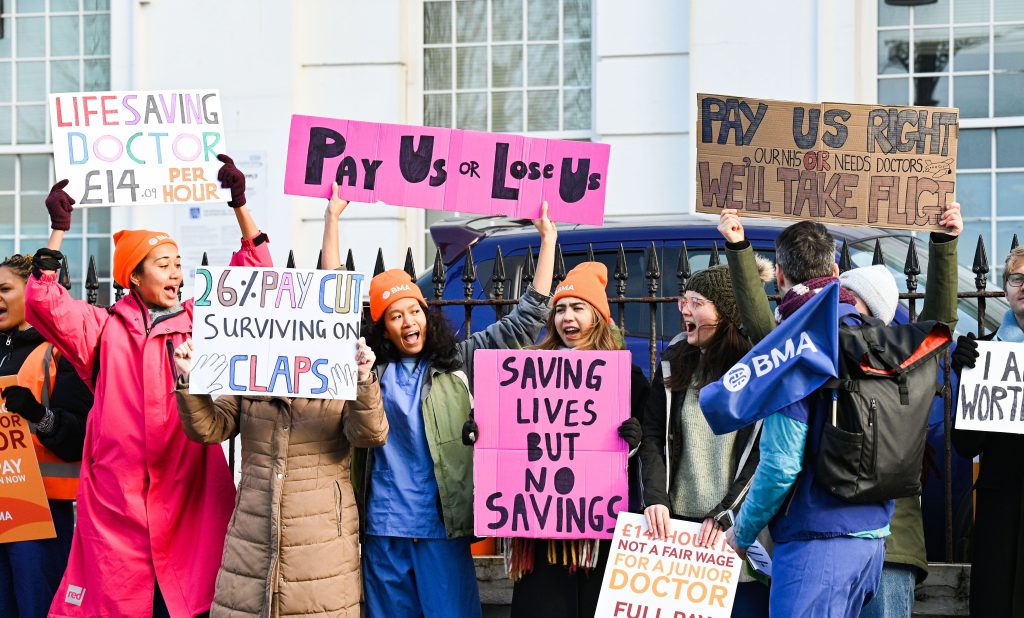
Brighton - Photo Simon Dack Alamy Live
News
Yet Barclay simply stated that he wanted to "see a fair deal that increases their pay" but could see "no prospect of getting into serious and constructive talks" unless the strike action was cancelled, and the BMA changed its demands. Not to listen to the demands of junior doctors is an affront against which the workers have already declared "Enough is Enough!". Turning truth on its head, Barclay is trying to give the impression that by striking and taking a militant stance, the junior doctors are hampering negotiation. The opposite is the case. Negotiation can continue with or without ongoing action, and negotiation can only be meaningful if the doctors uphold their own dignity, which is exactly what their action reinforces.
Barclay asserted that the doctors' pay demands were "out of step with pay settlements in other parts of the public sector". This comparison is ridiculous and takes account neither of the objective criteria used to value labour and its reproduction, nor of the monopoly-dominated market forces that set the context to the setting of prices and incomes.
It is the government that has made an arbitrary "offer", which is the real pie in the sky. The government's miscalculation is based on the view that there is a limited national cake, a conception which serves to deprive people of an outlook. The size of the so-called cake is itself obscured, as are the means over cutting it, and the issue of who decides. Rather than some static national cake, there is accumulation of wealth by capital at one pole and impoverishment of the people at the other, commonly known as the wealth gap. This is what "affordability" means. To use words like "unrealistic" and "affordability" is an attempt to block the health workers from their own independent outlook, and to bind them to the outlook of the government.
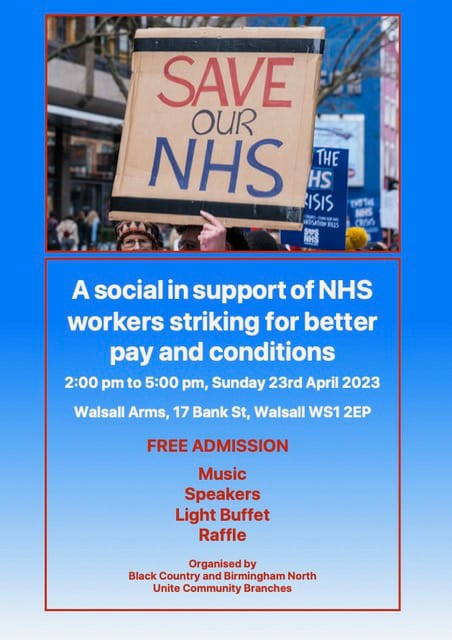
A healthy society needs a modern public health service with adequate all-round funding, investment and justly paid health workers and professionals. However, the situation has developed where poor pay and lack of investment have caused a huge skill shortage, leading to many junior doctors moving abroad or leaving the profession. Squeezing doctors' and nurses' standards of life and work has become the norm. With poor pay, the dignity of labour is placed under the cudgel, causing the labour resource to diminish and the valuable social programme that is the NHS to deteriorate. Today, the huge skill shortage is shrinking the productive capacity and labour, a shortage caused by lack of investment in training and low pay over many years. At some point, strike, or no strike, if there is to be a credible health service then the rate for the job must be met, regardless of the wishes of anybody. It matters not whether it is 35% or any other figure: if that is the requirement to ensure the productive resource for the NHS, then the figure stands, "affordability" or not. The question is whether a credible health service can be sustained without such a figure to maintain recruitment and pay the junior doctors their worth.
At the same time, the government resorts to prevention of organised opposition - including anti-strike laws - as a method of coercion whereby the police powers of the state are made available in an attempt to resolve the issue without taking the interests of the workforce into account. The workers' dignity stands in direct opposition to the privileged elite.
The arbitrary nature of government does not wish to concede any ground to any challenge to its rule. It does not wish to recognise the voice of the workers, give any space to the independent outlook of the working class, or come to any agreement with workers' organisations in civil society such as trade unions. The gatekeepers of governance are intent to hold the doors to decision-making power closed, with total disregard for and placing themselves above human relations. In contrast, empowerment for workers across the board is on the agenda, and the movement of health workers and the people as a whole is gathering pace to turn the tables on the government and ruling elite. The situation demands that health workers and people participate in the decision-making required to protect and develop the publicly-owned healthcare system.
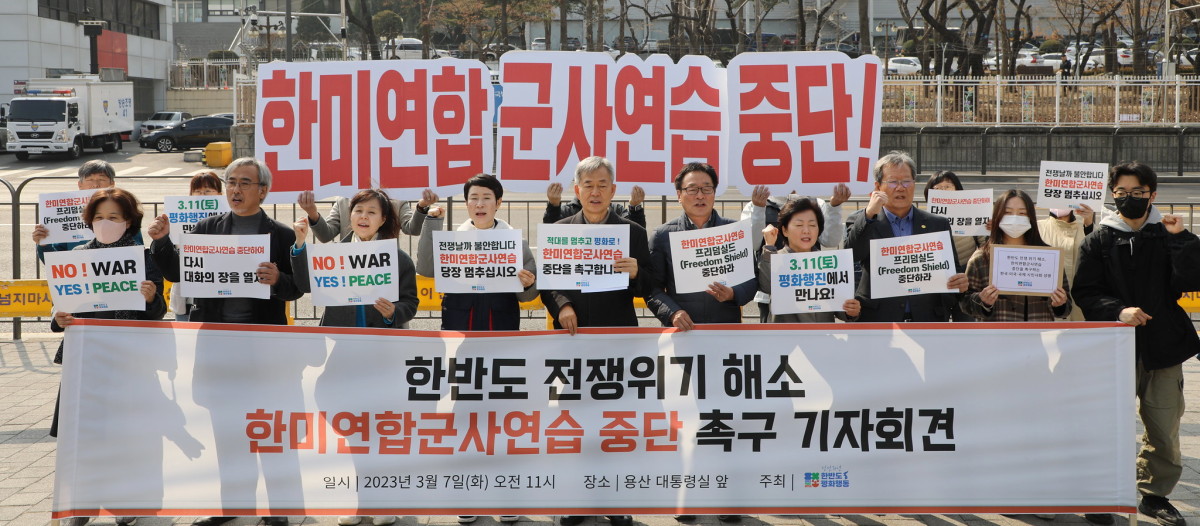
Press conference and picket in Seoul, March 7, 2023,
calling for end to U.S.- ROK military exercises
The dangerous militarisation of the Korean Peninsula by the US continues as part of its hegemonic ambitions to dominate East Asia and threaten the Democratic People's Republic of Korea (DPRK) and also China. The US has been conducting ongoing military and nuclear exercises on land, sea and in the air, in and around the Korean Peninsula, into 2023, as it has continued its 70 years of interference and provocations on the Korean Peninsula following the ending of the Korean war in 1953.
According to reports, the exercises in March this year were not only the largest in many years but even the pretence that such exercises were "defensive" to the Republic of Korea (ROK) has now given way to open declarations that they are aimed at waging war against the DPRK, at "occupation of Pyongyang" and at a "beheading operation". As usual the US and its allies wheel out the false claims that it is the DPRK that is the threat to peace on the Korean Peninsula to justify their continued and ongoing military activities.
The DPRK, its leaders and people's government, far from being a threat to peace, have always stood for peaceful re-unification of the two Koreas and continue to take stands against the interference of the US and for peace worldwide. Unlike the US, Britain and other powers that condemn the DPRK's existence and its right to be, the DPRK has not invaded and occupied any country. That the DPRK defends itself against US nuclear weapons and nuclear blackmail is not a crime but is its right, as is the right of all nations and peoples to defend their self-determination and peaceful development. For this defence of the sovereignty of its socialist system, the DPRK is justly admired by justice- and peace-loving people in Britain and throughout the world.
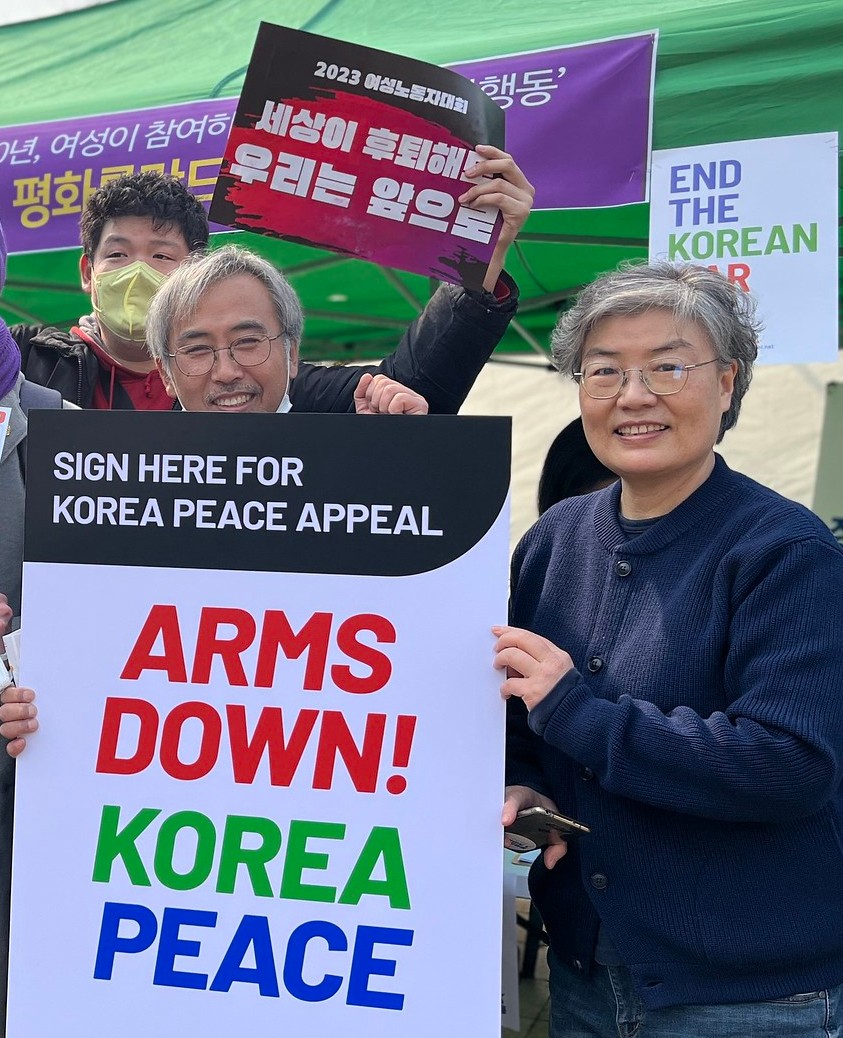
March 4, 2023 action calling for end to Korean
War
On the other hand, the US still has an estimated 28,000 troops stationed on Korean soil. It is an occupying power left over from the 1950s. It was in 1950 that the US instigated the Korean war, and the US, Britain and their allies committed untold atrocities. In the war, three million people died and the division of the one nation of Korea continues to this day. The US remains the threat to peace on the Korean Peninsula. This year marks the 70th anniversary of the signing of the armistice agreement in 1953. It is an essential demand, decades overdue, that the US sign a peace treaty with the DPRK.
The US is staging ongoing "joint" exercises with the ROK using its nuclear strategic bombers, stealth fighters and a Carrier Strike Group, creating an extremely dangerous situation, to which the people of Korea, both north and south, are firmly opposed. The latest US exercise Freedom Shield simulated an all-out US invasion of the DPRK and was staged from March 13. On March 20, for five days, the US 51st combat air division of the 7th US air force and south Korean air force staged an air-to-air live firing and air-to-surface bombing drill in the West Sea of Korea, aimed at raising the capability of a precision strike at the DPRK's "core targets".
Then for four days from March 26, the Ssangyong drill was launched conducting a joint landing drill for "occupying a city" (a thinly-disguised Pyongyang) of the DPRK with involvement of ROK armed forces. This Ssangyong drill went through a new provocative phase called "decisive action", which involved dozens of warships and other vessels including the US navy's amphibious assaulting ship Makin Island laden with scores of F-35B stealth fighters, various types of fighters and amphibious assaulting armoured cars, the US 1st Marine Expeditionary Unit.
As part of these warmongering exercises, the US nuclear carrier Nimitz was to be additionally dispatched first from the US mainland in case of contingency on the Korean Peninsula, alongside the special warfare units of US allies such as Britain and Australia and the ROK armed forces. Reports say that Britain has deployed its Royal Marines to the Korean Peninsula this year for the first time since the Korean war to join the US in its war preparations against the DPRK. This warmongering provocation by Britain is no accident. The Royal Marines of 41 Independent Commando had carried out amphibious raids behind north Korean lines between 1950 and 1951 as part of the armed forces of the US and its allies, including Britain, fraudulently dispatched under the United Nations flag, which invaded and occupied Korea.
.jpg)
One of many anti-war actions against Britain's
warmongering role alongside the US in NATO
On March 30, two B-52H nuclear strategic bombers of the US air force flew over the Korean Peninsula to openly pose a threat to the DPRK. From March 30 to April 1, stealth fighters from the US navy's amphibious assaulting ship Makin Island conducted a drill for striking ground targets above Kangwon Province, a province divided by the border with the DPRK.
Following these exercises, the US also staged a joint naval drill with Japan and the ROK including the US navy's nuclear-powered aircraft carrier Nimitz which arrived at the US Pusan naval base in the ROK on March 28. Chinese Foreign Ministry spokeswoman Mao Ning denounced the two-day drills in the waters of the Sea of Japan as the main source of tensions on the Korean Peninsula, stressing that Seoul, Washington and Tokyo "should stop military pressure and create favourable conditions to de-escalate tensions and resume dialogue" in the region.
The US have also announced that they will lead these current ongoing war exercises up to the largest-ever "combined joint firepower annihilation drill" in June when the anniversary of the end of the Korean war occurs. On April 3, a KCNA commentary "War Maniacs' Reckless Move" [1] remarked: "This shows that their hostile acts against the DPRK have reached the worst phase". It added that this "reminds the people and army of the DPRK of June 1950".
This renewed crime against peace and humanity on the Korean Peninsula against the Korean people by the US, Britain and its allies is unconscionable and must rightly be condemned by the peoples of the world.
For its part, Workers' Weekly condemns the refusal of the British government to oppose and call for an end to these ongoing and large-scale military exercises and provocations against the DPRK and demands that Britain gets its marines and other forces out of the Korean Peninsula. Britain holds a prime responsibility to maintain the peace, a responsibility it also holds from its involvement in the Korean war and its crimes then on the Korean Peninsula. Britain should refuse to submit to the US-inspired policy of, war, sanctions and threats against the DPRK and its leadership.
The peace-loving people of Britain wish the DPRK and the Korean people every success in their striving to secure peace on the Korean Peninsula and to put an end to the more than 70 years of US-engineered division, tension and strife between north and south so that the Korean people can move forward united, peaceful and prosperous.
Note
1. "War Maniacs' Reckless Move", KCNA commentary,
April 2, 2023
http://www.kcna.kp/en/article/q/55cc18c6b08e669b07a7abf7b8c9dce3.kcmsf
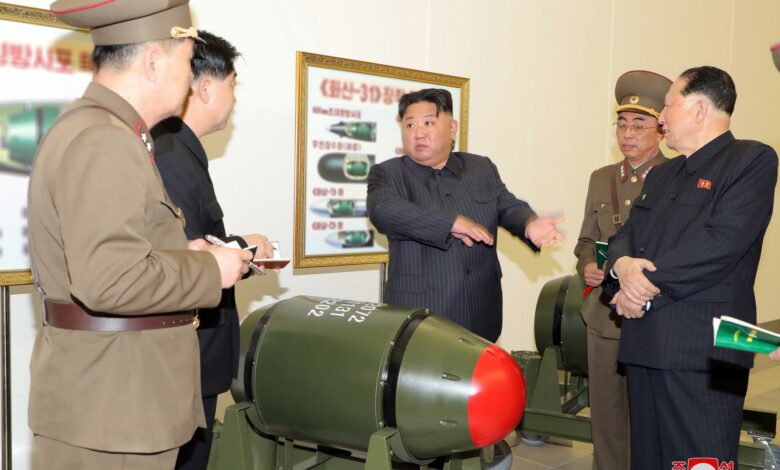
On March 16, the Democratic People's Republic of Korea (DPRK) successfully test launched the Intercontinental Ballistic Missile Hwasongpho-17. The test launch was to serve as a warning to the US that the DPRK would respond firmly to the ongoing large-scale US-Republic of Korea (ROK) joint military exercises called Freedom Shield being conducted from March 13 to 23.
Rodong Sinmun, the newspaper of the Worker's Party of Korea (WPK), reported that from March 21 to 23, a new unmanned nuclear assault underwater craft called "Haeil" was also successfully tested. This strategic weapon, developed over a ten-year period, is designed to infiltrate the enemy's operational waters and cause maximum damage to its naval strike groups as well as operational supply depots and ports.
The DPRK also conducted a drill on March 22 to test cruise missiles as part of tactical nuclear missions. Rodong Sinmun added that these weapons tests were conducted to let the US and the ROK know that in the event of a confrontation, they would get more than they bargained for and that they should immediately stop their "reckless anti-DPRK war drills".
The launch of the Hwasongpho-17 missile and other weapons tests are a direct consequence of the ongoing provocations by the US imperialists against the state and security of the DPRK. This year alone, 20 joint military exercises are planned involving the US, ROK, Japan, Australia and others. All are targeted at invading the DPRK, overthrowing its socialist system and taking over the entire Korean Peninsula to use as a launching pad for war against China and Russia.
While the US/NATO forces and the media in Britain and elsewhere present the DPRK as an aggressor and create doubt about its desire for peace, the facts tell otherwise. Rodong Sinmun noted that the "grave challenging situation against the state security of the DPRK requires it to have stronger war deterrents for firmly supporting its peaceful socialist state-building activities". It also added that the frequency, scope and intensity of US-led war threats and aggression require that the DPRK take measures to ensure that the entire armed forces are prepared for an "all-out war".
Responding to the unfolding acts of aggression and war by the US and ROK, more than a million young DPRK women and men mobilised themselves for the Korean People's Army in a recent campaign, to express their national pride and patriotism, and their determination to defend their homeland against all threats.
It is certain that the people of the DPRK and the democratic and peace-loving people of the ROK do not want a war to break out on the Korean Peninsula. The people of the DPRK have the right to be; the people of the Korean Peninsula have the right to self-determination and peace.
It is the US/NATO, including Britain, which must be held to account for warmongering and aggression on the Korean Peninsula, and attempting to destabilise the DPRK through unjust UN Security Council sanctions and their own, engineered by the US to effect regime change in the DPRK.

Korea Peace Appeal Campaign launching a new project with
a press conference,
February 14, 2023,Korea Peace Action for the 70th Anniversary of the
Armistice
This year marks the 70th anniversary of the signing of the Korean Armistice Agreement on July 27, 1953, which ended the fighting in the Korean War. In 2020, anti-war and civil society organisations in the Republic of Korea (south Korea) launched the Korea Peace Appeal. The goal is to collect 100 million signatures over a three-year period, from the 70th anniversary of the US launch of the Korean War on June 25, 1950, to the 70th anniversary of the day the Armistice Agreement was signed.
According to the organisers, the Korea Peace Appeal "is an international campaign that seeks to amplify voices calling for an end to the Korean War and a transition from armistice to peace beyond the Korean Peninsula and throughout the world". The goal is to engage others through the Appeal and to present the signatures to the UN as well as to those countries which participated in the Korean War.
Close to 400 Korean organisations from the Republic of Korea and more than 75 organisations from East Asia and around the world have endorsed the Korea Peace Appeal.
This is an important initiative reflecting the aspirations of the Korean people to end the Korean War and establish a permanent peace on the Korean Peninsula, as a contribution to peace in East Asia and the world.
The Korea Peace Appeal can be supported by signing online and downloading and printing a copy of the Appeal to secure the signatures of co-workers, friends and neighbours.
For more information about the Korea Peace Appeal and to contribute to its success by signing, printing and circulating copies of the petition, click here [https://en.endthekoreanwar.net/].
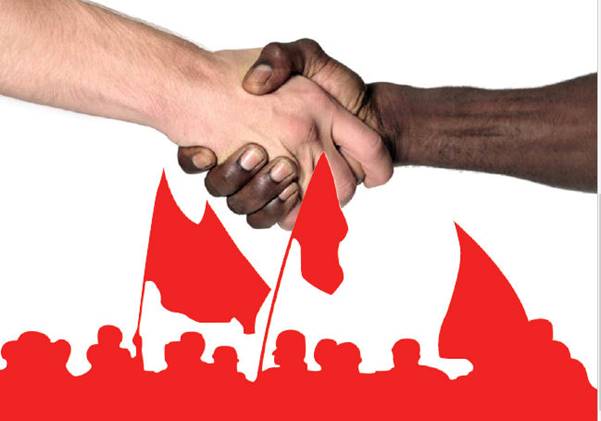
London Monday May 1st
ASSEMBLE CLERKENWELL GREEN EC1 at 12 NOON
MARCH TO TRAFALGAR SQUARE FOR RALLY MONDAY MAY 1ST
for further details see : http://www.londonmayday.org
.jpg)

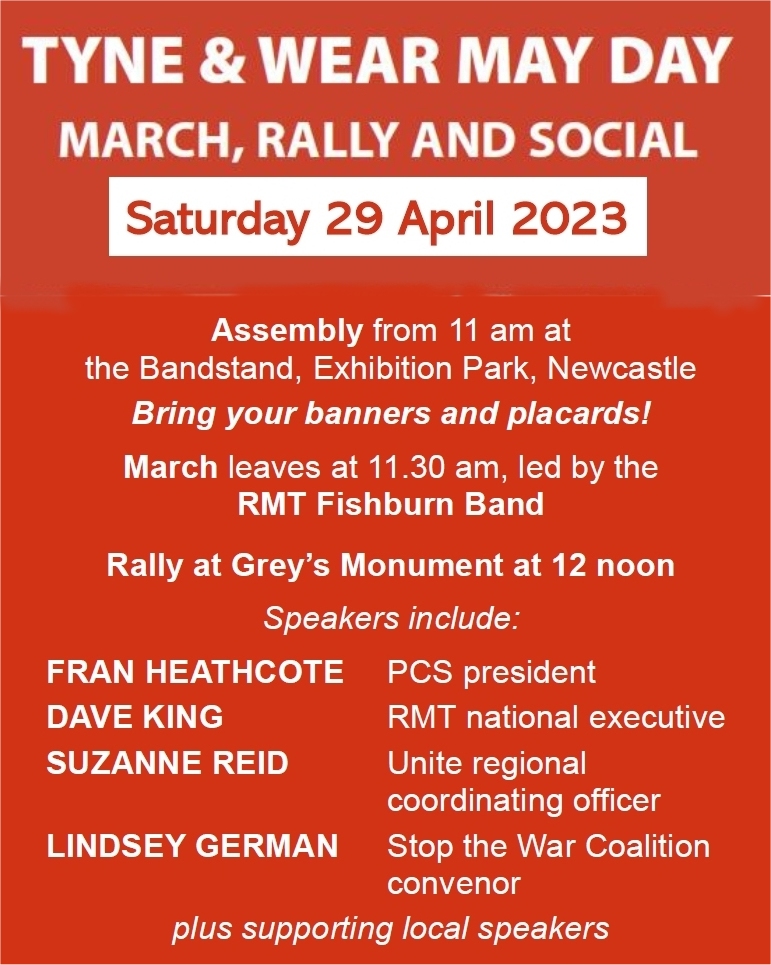
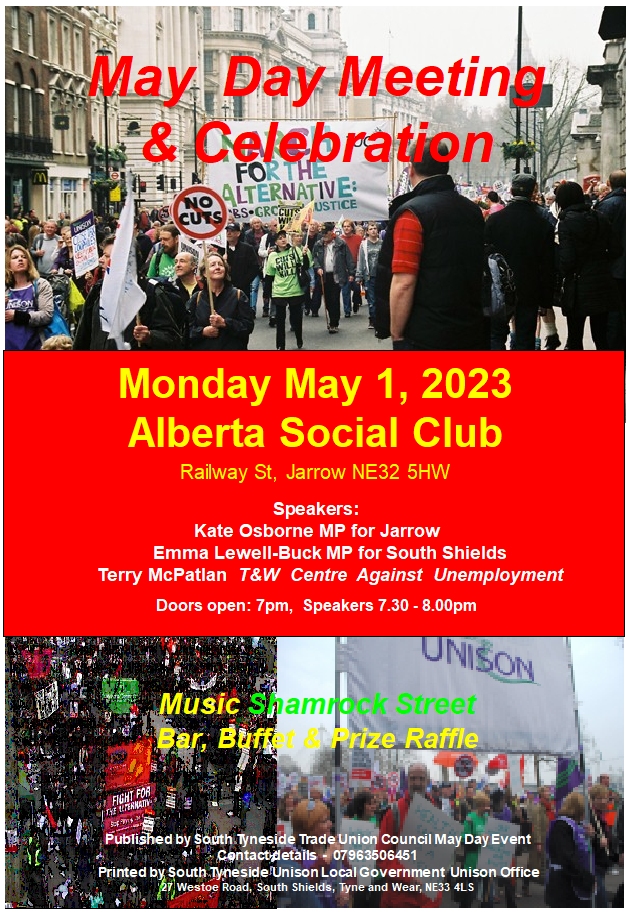

Receive Workers'
Weekly E-mail Edition: It
is free to subscribe to the e-mail edition
We encourage all those who support the work of RCPB(ML) to also support it
financially:
Donate to
RCPB(ML)
Workers' Weekly is the weekly on
line newspaper of the
Revolutionary Communist Party of Britain (Marxist-Leninist)
Website:
http://www.rcpbml.org.uk
E-mail:
office@rcpbml.org.uk
170, Wandsworth Road, London, SW8 2LA.
Phone: 020 7627 0599: